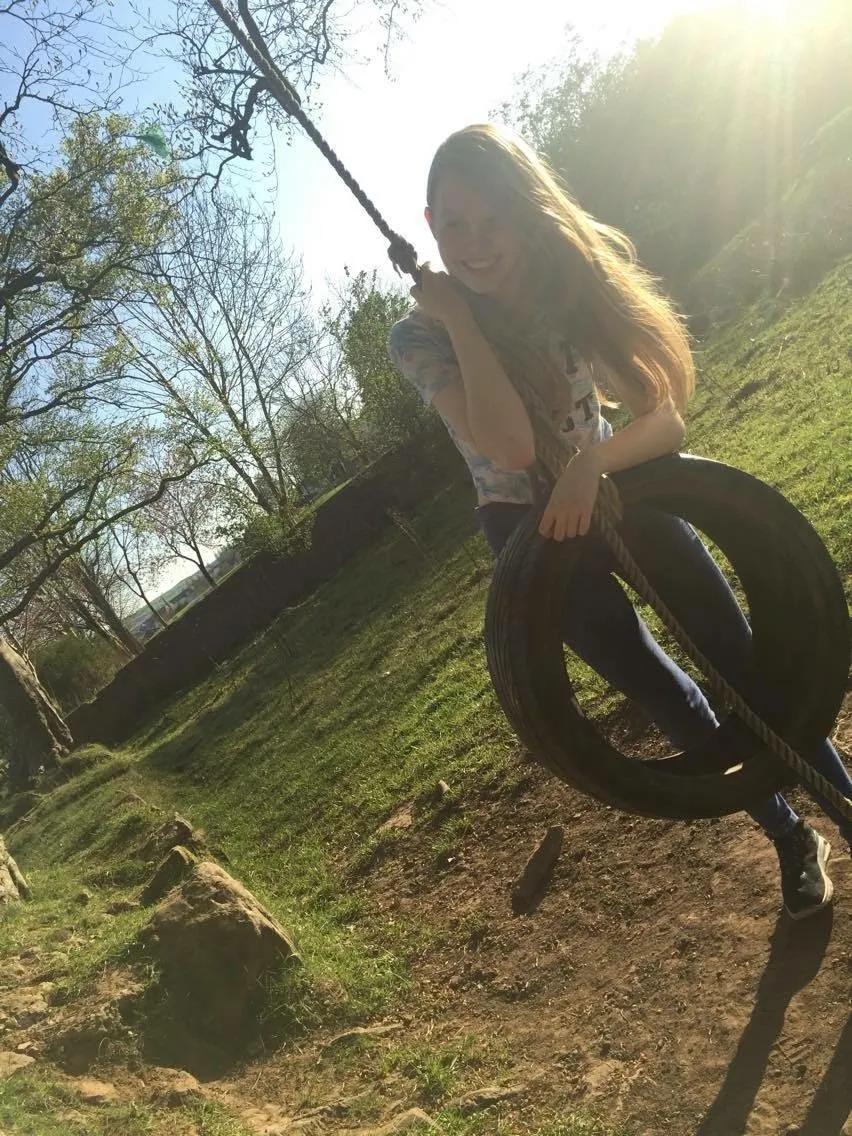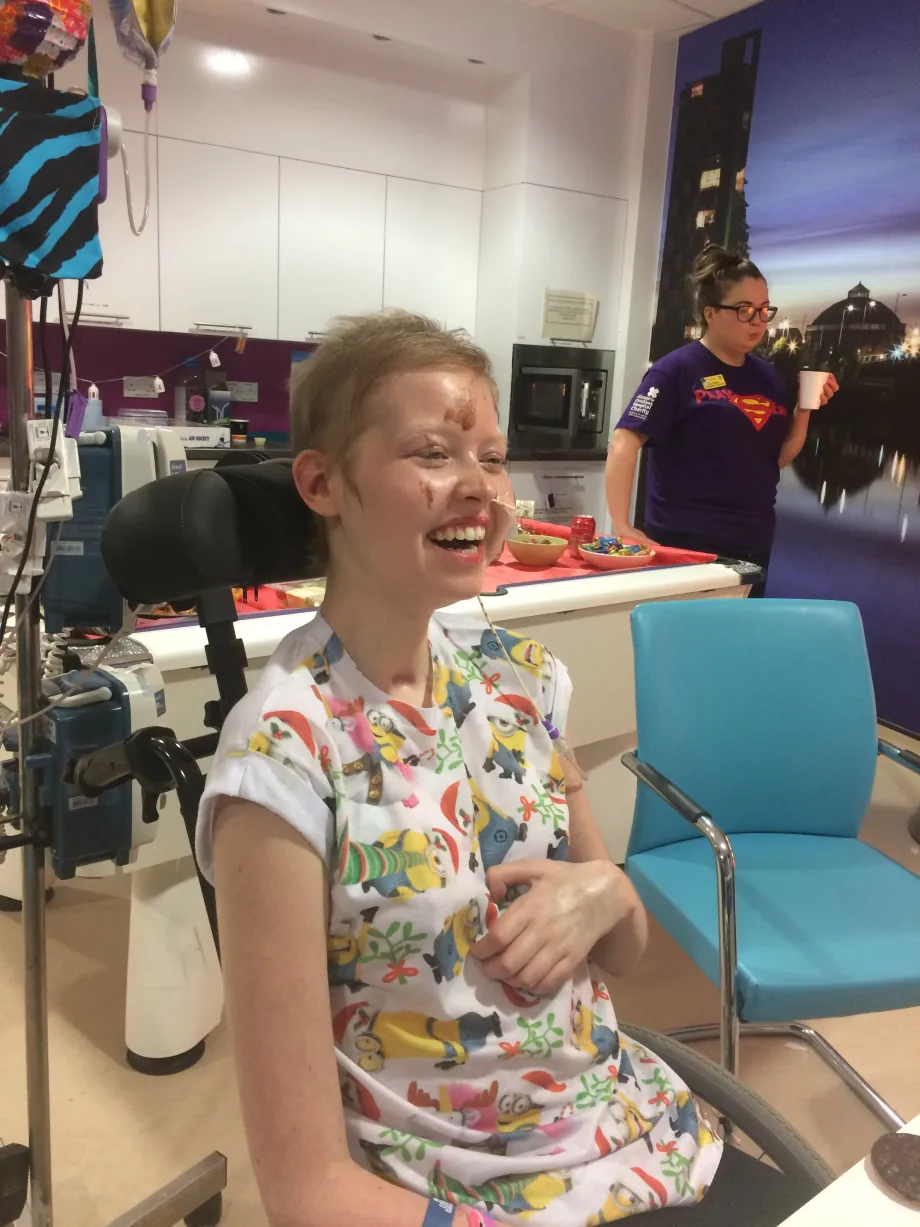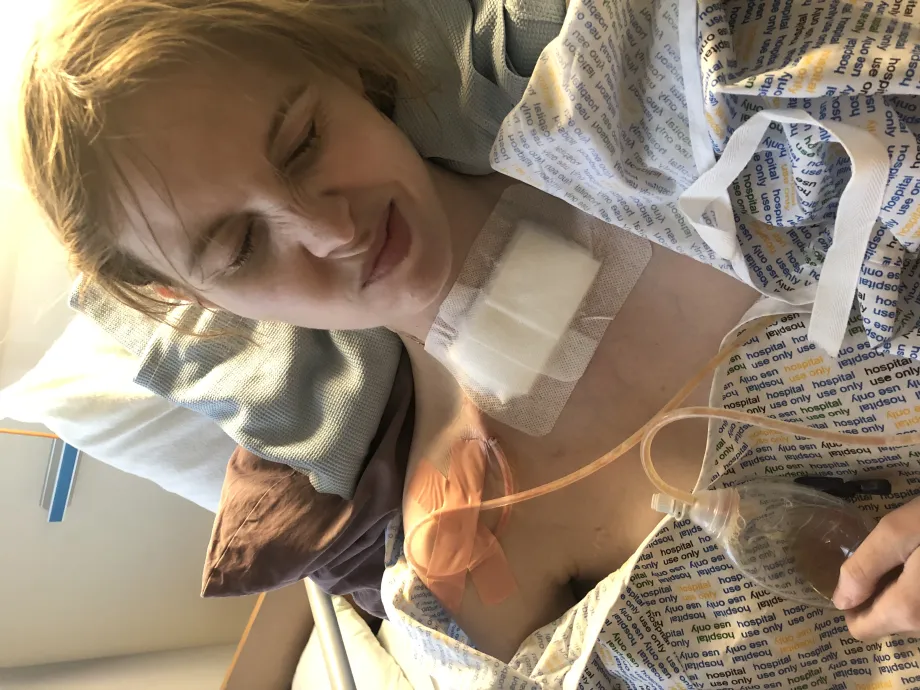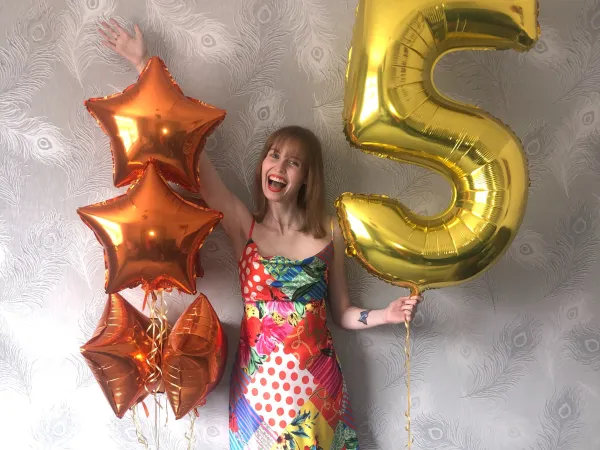I was diagnosed with acute lymphoblastic leukaemia (ALL) in 2016. My mum had been continually taking me back and forth to our doctor, as I was suffering from severe pain in my lungs, and we were trying to figure out what was causing it. The pain intensified so much that I would say that I thought I had a punctured lung. The doctor treated it as asthma, and I was given an inhaler to take when the pain flared up. Despite this, the pain persisted, and I also started experiencing really bad cramps in my legs. It was so bad that all I could do was lay on the couch, struggling to breathe, unable to get up and move. My mum would drive me to school, as I was unable to walk the distance.
She also took me to our local A&E on numerous occasions, where they helped me to use my inhaler, and they determined my leg pain to be caused by growing pains. I was only 14, so nothing sinister or untoward was going through my mind, but Mum was the advocate for me. She asked all the questions, double-checked everything, and probably knew herself, just being my mum, that something really wasn’t right. I was just floored with pain and desperate to be at home and feeling better.
One night, everything got really bad, and Mum drove me back to A&E at our local hospital. They advised us to drive to our local children’s hospital, where I was admitted for the night. No one had ever taken a blood sample from me and my mum asked if they could take one to rule everything out.
The blood results came back the next morning and we were taken by ambulance to Glasgow Royal Hospital for Children. We were admitted on to the cancer ward, without realising it at the time. My consultant took Mum into a room, where he gave her the news that I had leukaemia. When they told me, I remember going into denial and couldn’t even look at my consultant. I was so angry with him, because he delivered the bad news. It was easier to blame him than accept that I had cancer.

Eilidh one month before her diagnosis
Treatment
Once bone marrow samples confirmed my diagnosis, I began the treatment of intense and aggressive chemotherapy. I suffered from a wide range of side effects including hair loss and nausea, and I also developed diabetes from steroid medication. Things then took a turn for the worst and became very sinister. About three weeks into the chemotherapy, my stomach started to swell, and I was in severe pain. My medical team carried out different tests to try and discover what was causing my pain. I was transferred to intensive care for pain management, and it was there I began to deteriorate quickly. I remember not being able to stand up or put weight through my legs, and the constant fear as the world around me got darker. It felt as if I was living in my body but not able to control it.
Then, everything went dark for me, as I was put into an induced coma for two months. I ended up having emergency surgery, which resulted in a stoma being created. It was discovered that the chemotherapy – due to its intensity and aggressiveness – had caused my gut to perforate. I became extremely unwell and each day I was fighting to stay alive. My mum and dad had to make such important decisions about my health during this time, but never gave up on me and the small flicker of fight they could still see burning. I also developed unusual infections in my brain and lungs. The chemotherapy had killed the cancer but had left all this collateral damage that ended up almost killing me.

Eilidh at the ward Christmas party during leukaemia treatment
Being diagnosed with thyroid cancer
I was diagnosed with thyroid cancer in 2019 while I was still undergoing treatment for leukaemia. We attended an appointment to discuss an enlarged node in my neck, detected while I was in intensive care. As soon as we walked in, we were told that it was thyroid cancer. This came as a huge shock, not least because I was 17 years old and now had not one, but two completely different types of cancers, but also because we were completely unaware.
Because I already had the experience of leukaemia, and was still going through treatment for it, I felt more prepared and determined for what was to come. I finished my leukaemia treatment and then two weeks later went in to have surgery on my neck, having my thyroid and thyroid cancer removed. Thankfully, this went well, and I was only in hospital for a couple of days, which I couldn’t believe, given my track record of long hospital stays. I rang the end-of-treatment bell for both cancers at the end of that month, thinking that was me finished with cancer treatment.
However, for the following four years I was monitored by my thyroid cancer team, and with continually slow rising blood markers, at the end of 2023, I had a scan which showed what they had believed was happening. I knew what was coming – sadly, I’d relapsed and was devastated to be facing cancer again. I remember feeling completely drained mentally and physically, like I couldn’t go on. I just wanted to rest.
I underwent neck surgery to remove all the thyroid cancer tumours at the start of 2024. I endured major complications which left me terrified and riddled with anxiety. The next phase was to have radioactive iodine treatment, requiring me to isolate in hospital for a few days. After a neck scan showed positive signs that treatment had worked. I was discharged and went home to my family, who I’d missed so much while I was in hospital on my own for the first time. My doctors will be keeping a close eye on my bloods and scans to know if the cancer has completely gone, but as it stands, we’ve done everything we can to remove and mop up any remaining cancer cells.

Eilidh in hospital following relapsed thyroid surgery
Losing my identity and reclaiming some control
Over the years, my emotions have been on a rollercoaster. About a month after I rang the bell for the end of my leukaemia treatment, I started to feel that I’d lost myself. For years my world revolved around the fact I had cancer. I’d spent each day fighting to survive, confined to four hospital walls, so when I became cancer free, I felt unrecognisable. Cancer became my whole being and without it, I was nothing.
When I was first admitted into hospital and diagnosed, it felt like time stood still for me, whereas for everyone else, life just carried on. When I got home, I still felt like the 14-year-old who walked onto the ward, except I was now 17. I was so far behind. My peers had worked through school, developed friendships and relationships, and really discovered themselves, who they were as a person, and where they wanted to be in life. But me? I’d been watching life from a window. I was so confused as to who I was and who I was meant to be.
Advocating for other young people with cancer and raising awareness of cancer in teenagers has helped me take back control of some of those feelings. It has become my way of dealing with what I’ve been through, and that cancer is still a part of me but in a positive way. It has helped me fill that void of not knowing who I was.
Charities like CCLG are so important
When I was discharged for my leukaemia, I was sent CCLG’s Living beyond cancer information resources, which are guides for survivors of childhood or teenage cancer. Having something that was specific to leukaemia was really helpful. It’s a reminder for me to refer to in the future, as it summarises anything I need to look out for – because there’s a lot to remember, especially when life’s moving on after cancer and it’s not at the forefront of my mind anymore.
Having charities like CCLG to advocate for and support teenagers and young adults with cancer is so vital. They help to bring awareness of cancer to this age group and medical professionals, which helps support early diagnosis and prevent misdiagnosis.
It’s so important to make people aware of the signs and symptoms of cancer in teenagers and young people. It’s not talked about enough. I had a talk in school, only months before my first diagnosis, about lumps and moles being signs of cancer, but there wasn’t one mention of symptoms of blood cancers. With all my signs and symptoms, like the breathlessness, the leg cramps, and small red dots on my wrists, we looked them up later and each one was a sign or symptom of leukaemia. They were all there, but at the time, we didn’t know what to look for.
Supporting a young person with cancer
I think the best thing to do for a young person with cancer is just to be there for them. Listen to them, be a shoulder to cry on if they need it and remember that cancer does not define them. It’s important to not treat young people with cancer any differently. It’s an extremely isolating time being in hospital and unsure of how you’re going to feel each day – which is a completely valid emotion to experience. Every young person will have their own coping mechanism when facing cancer, but it’s important to support them in whatever way possible to mean they continue to stay positive.
My advice to young people worried about their health
Young people can sometimes think they’re invincible and ignore what they’re feeling as they believe it can’t be anything serious – especially not cancer. Or, on the other hand, they’re too shy to speak up in case they get dismissed. But you should always trust your body. Your body will tell you when something’s wrong, and you are the advocate for that feeling, so don’t doubt it and don’t feel like you can be passed around. If you feel something’s wrong, keep questioning it.
Cancer in young people isn’t spoken about enough, making it seem like it’s really uncommon to receive a diagnosis, but it’s not. In this age group we’re not children, we’re aware of what we’re feeling but at the same time we’re not adults and don’t have all the answers. Getting support from family members when attending appointments is vital in making sure our voices are heard.
Push for a blood test if you feel like something isn’t right. That’s always my main piece of advice. If my mum hadn’t pushed for a blood test, my cancer wouldn’t have been diagnosed as early, and this could have led to a very different and more serious outcome.
What life looks like now for me
For my leukaemia, I became five years cancer-free in 2024, which means I am medically cured. I went back to the kids’ hospital to have my final appointment, and it was an emotional day visiting all the staff that helped save my life. However, for my thyroid cancer, it’s going to be 10 years before I can be discharged, and I’ll continue to be monitored during that time.
I’ve grown up with cancer being a massive part of my life, and even now it’s still not over. I’m content with my life and know that everything I’ve been through has made me the person I am today. I work as a school assistant – which actually stemmed from seeing all the kids wheeling around with their drip stands on the ward. I’m extremely proud of how far I’ve come, and that all the tough days, hard recovery and overwhelming fear was worth it because I’ve been given a second chance at life. I’m excited for my future and look forward to living out the rest of my life, happy and healthy.
Create a brighter future for children and young people like Eilidh
By supporting us, you’re driving life-changing progress and making a real difference to young lives. Join us today to help shape brighter tomorrows.

